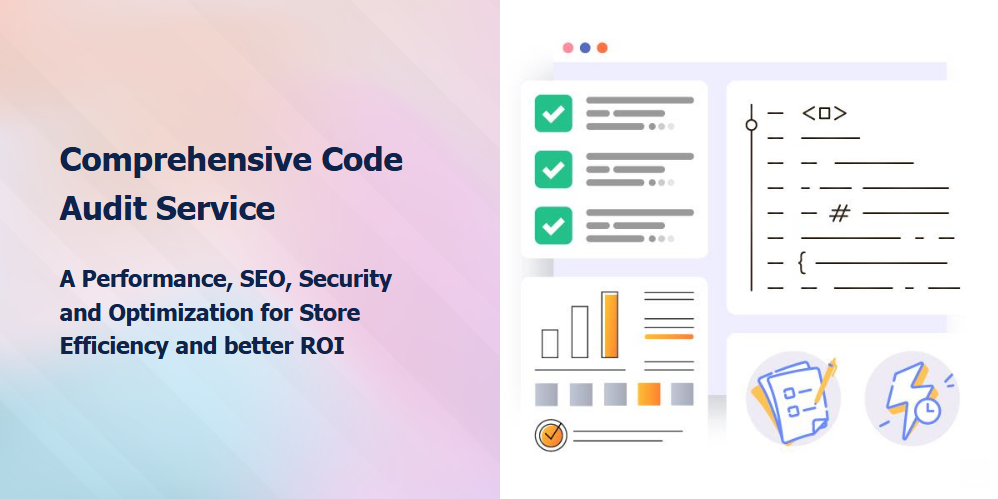Magento Code Audit Service

Magento Code Audit Service
A code audit is essential to identify hidden bugs, deprecated code, and inefficient logic. Our Magento experts thoroughly inspect your code to guarantee it follows best practices, improves performance, and ensures compatibility with the latest updates. Eliminate risks and maintain a stable, secure, and fast Magento store!
When Should You Get a Code Audit?
Signs It's Time for a Code Review
- Slow Page Load - If people have to sit around while pages on your site slowly load, it will be enough for them to click off and find a competitor whose website is faster. A slow load time could be due to inadequate coding on your page, high-resolution images, or a busy server.
- Server Timeout- The server can die or become unavailable, even with light or moderate traffic. This unresponsiveness may signal server configuration/service issues and/or inefficient or unoptimized code.
- High Resource Consumption- An abrupt spike in CPU and memory utilization during general operation often indicates poorly performing processes or a memory leak; this behavior may cause the site to malfunction, potentially leading to server crashes.
- Security Breach: Viruses and unauthorized access speak of leaked customer data and low trust. When one security threat occurs, it is time to change settings to prevent a leak of account and personal information.
- Feature Failures: Certain features, such as the search bar or the checkout page, can fail and make a shopping experience awful. They can lead to poor customer experience, poor sales conversion rates, and an equally disappointing brand image.
- Admin Error: Sometimes, the admin panel’s interface can be ambiguous, or a bug in the backend can cause an error that may hinder product, customer, or configuration handling in the back end panel or admin panel. These issues usually cause operational glitches to arise.
- Frontend Error: Due to mismatches between JavaScript, HTML, and CSS, you might notice visual discrepancies in style, copy display changes, or broken UI elements, diminishing user experience and site aesthetics.
- Extension Conflicts: Multiple extensions may not play well together, causing unexpected behavior or code errors. This disrupts essential functionalities, requiring manual conflict resolution.
- Custom Code Issues: In most cases, custom codes slow down performance or develop inconsistencies in the output since they can disrupt the platform's standard functionality. Poorly implemented custom code integration burdens the application with instability and scalability issues.
- Third-Party Integration Issues: Third-party integration challenges consist of payment gateways and ERPs or CRMs; if their integration hitches, core business processes, such as payments, inventory, or customer database, are affected, implying operational complications.
- SEO Mistakes: Duplicate meta tags, missing sitemaps, or incorrect canonical tags would negatively affect the rank on SERP and lead to a drop in traffic.
- Analytic Monitoring Issues: There are problems with analytics monitoring and discrepancies between figures obtained from Google Analytics and UTM parameters.
- High Traffic Challenges: When it’s ‘busy’ like holidays or intensive marketing activities, the site may lag or fail to cater to many visitors. A lack of load balancing or a weak server will cause slowness or crashes in between.
- Inventory limitations: The efficiency of the number of products or categories is central to the service. However, their manual management is usually caused by error. This can lead to product visibility problems or problems arising from order handling from low inventory control stocks.
Magento Code Review Audit & Process
Explore the phases of the Magento Code Audit Process by MageDelight
-
Code Quality Check
Inspect the code for any inefficiencies and ensure it's aligned with best practices to boost performance and maintainability
-
Configuration Review
Confirm that platform settings are correctly configured to minimize any risk of performance or security vulnerabilities
-
Customization Analysis
Evaluate custom code to identify potential integration issues that could interfere with core functionality
-
Third-Party Extensions Assessment
Check each extension for compatibility, look for required updates, and resolve conflicts affecting performance
-
Database Optimization
Streamline database structure and queries to reduce load times and server demand
-
Server Configuration Tuning
Adjust server settings to maximize performance, security, and stability, particularly under heavy usage
What Will You Get with Our Code Audit Process?
Here’s a Snapshot of the benefits of the Magento Code Audit Process by MageDelight
- A Summary of Critical Issues & Potential Risks
- SEO Optimized Store
- Recommended Code Improvements for Performance
- Peak Performance & Faster Load Times
- Eliminated Security Risks
- Prepared Store for Future Upgrades and Scalability
- Smooth Inventory Management
- Track the Orders Data Easily






